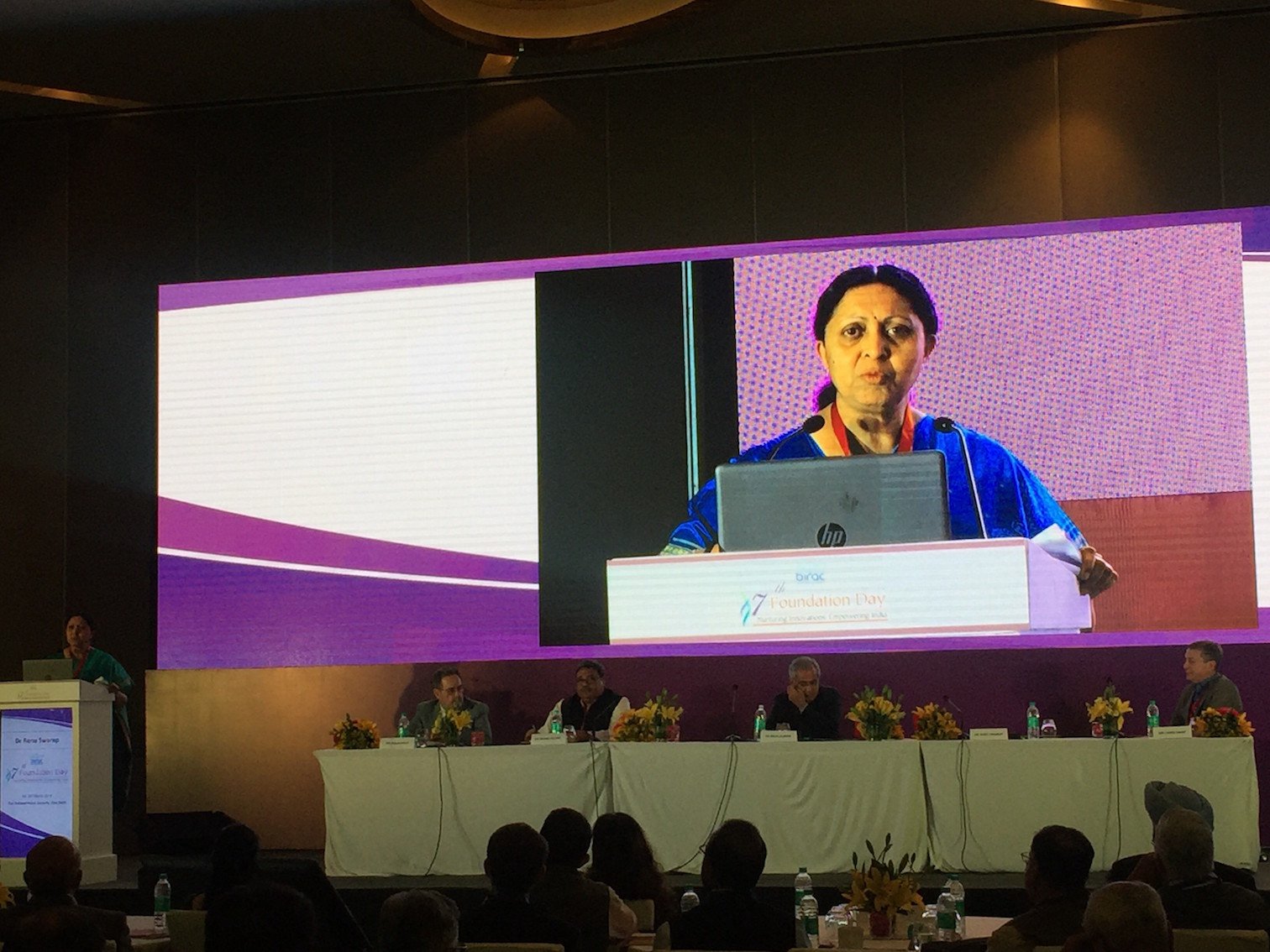Ignite, Innovate, Incubate: BIRAC celebrates 7th Foundation Day
March 20, 2019 | Wednesday | News
BIRAC celebrated women in entrepreneurship, who were responsible for impactful biotech innovations, through the BIRAC TiE-WInER Awards
Dr Renu Swarup addressing the gathering
BIRAC with its motto to ‘Ignite, Innovate, Incubate’, recently celebrated its 7th Foundation Day with conversations around the importance of nurturing and fostering innovation to accomplish the developmental goals of India.
The Chief Guest of the Foundation Day was Dr. Rajiv Kumar, Vice Chairman, Niti Aayog and other dignitaries present on the occasion were:
- Renu Swarup, Secretary, DBT & Chairperson, BIRAC
- Ted Bianco, Former Director, Wellcome Trust
- Mohd Aslam, Adviser, DBT and MD, BIRAC
- Chris Karp, Director, Discovery & translational Science, Bill & Melinda Gates Foundation
The Foundation Day was well attended by over 300 participants including innovators, policy makers, investors, academic researches, startups and entrepreneurs. A delegation of over 20 women entrepreneurs from Nepal, Bhutan, Maldives and Afghanistan also participated.
The foundation day celebrations began with engaging conversations around the importance of translational research to take on big health challenges across India in particular and in the world in general. Dr. Ted Bianco, Former Director, Wellcome Trust opined, “Science needs to be ready for the next major epidemic that may come our way. With new diseases developing and being found across the globe, it is vital that research focuses on targeted mitigation of these. We need to move from reactive health science to pro-active health science”.
The BIRAC foundation day also witnessed the commemoration of young innovators and scientists who made significant contributions to the fields of hygiene and sanitation and the reduction of the disease burden in India. Further BIRAC celebrated women in entrepreneurship, who were responsible for impactful biotech innovations, through the BIRAC TiE-WInER Awards. Dr. Rajiv Kumar, Vice Chairman NITI Aayog, while handing the awards stated, “BIRAC has done excellent work in being able to connect and communicate with upcoming innovators. It is important to not just function as the fund provider, but to handhold and aid young innovators to develop and scale their innovations for improved health outcomes in India”.
Further, the ethos prevalent throughout the day also encompassed the need to promote and encourage the participation of women in the field of bio-technology. Success stories of women using bio-technology to create lasting solutions at the regional and global level were discussed and appreciated.
Dr. Renu Swarup, Secretary, Department of Biotechnology & Chairperson, BIRAC, said “Biotechnology holds enormous potential for impacting economic growth of the Country, which has been successfully demonstrated by BIRAC over these 7 years. Today across the country we have witnessed a growing demand for new innovation and these are technologically empowering the country. I am confident that India which has taken on a very strong leadership position will be a front runner in the Global ecosystem. The key to success is scalability and sustainability”.
Dr. Chris Karp, Director, Discovery & Translational Sciences, Bill & Melinda Gates Foundation adding optimism and energy to the audience, elucidated, “Our common goal is to harness (catalyze, source, nurture) innovation to develop and drive to impact transformative tools to address global health and developmental inequity. In terms of BIRAC’s motto- Ignite, Innovate, Incubate….Impact”. He provided many examples of such innovations on its way to impact.
Furthermore, preceding the BIRAC Foundation Day, the Grand Challenges Learning and Evaluation meeting set the stage for the discussions around scalability, applicability and funding of innovations targeted towards combating developmental issues worldwide. Echoing the take aways from the meeting, which was attended by over 100 participants from across the globe who have been associated with grand challenges, Dr Shirshendu Mukherjee, Mission Director, PMU-BMGF, explained, “We cannot just innovate for the sake of innovation. We need to understand the gaps and needs of the beneficiaries and then create innovative solutions to address those issues. Thus, ensuring an inclusive dialogue allows for successful last mile delivery of innovations from the labs to the land.”










